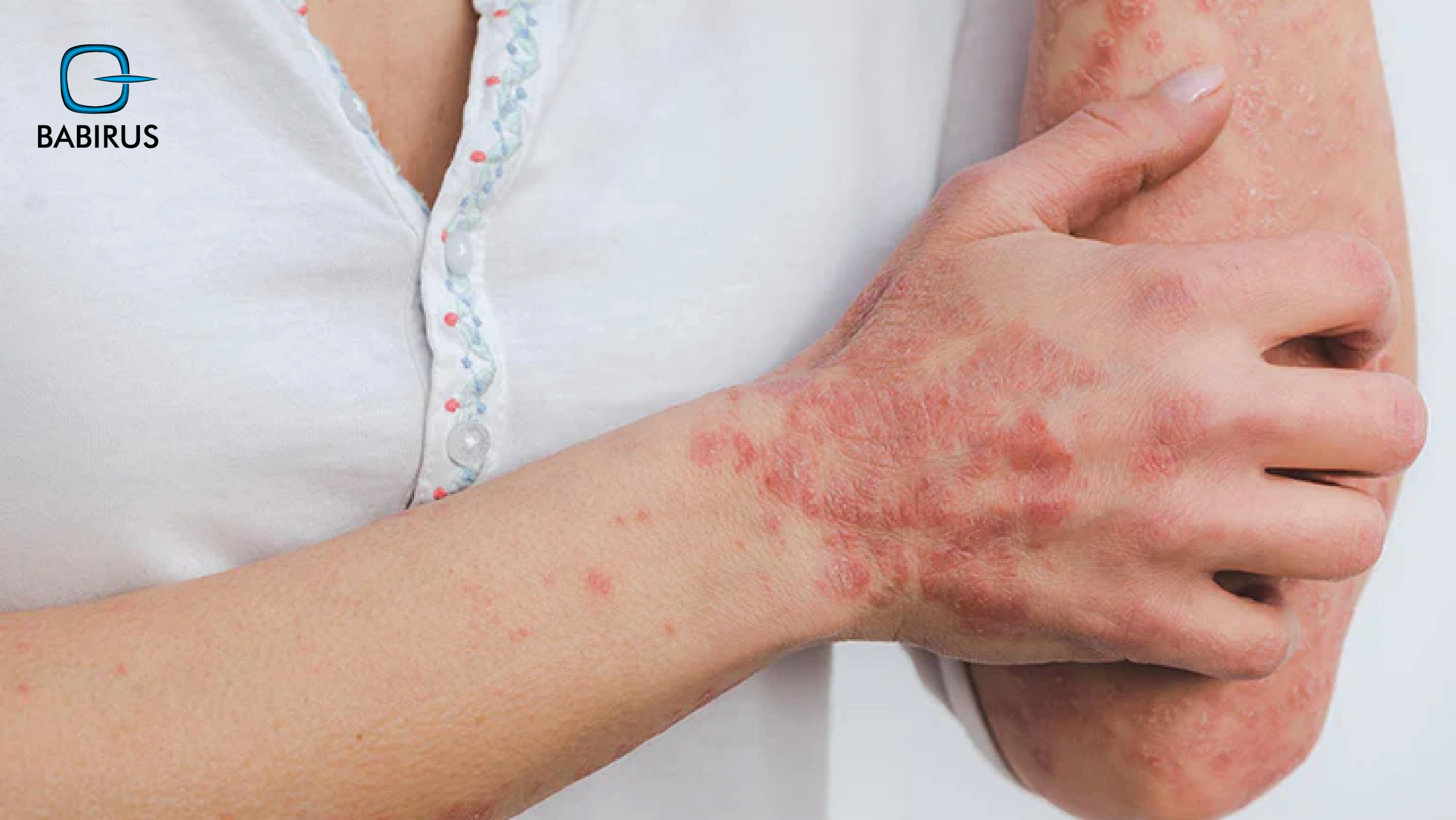Gut Health and Skin: Acne, Eczema, and Digestive Links

When your skin flares up with acne, eczema, or irritation, your first instinct might be to reach for a topical cream. But what if the cause isn’t just on the surface? Emerging research has made it clear: your gut plays a powerful role in skin health. The connection between your digestive system and skin, known as the gut-skin axis, offers a new perspective on chronic skin issues.
This blog explores how gut imbalances can impact your skin, the conditions most commonly linked to digestive health, and how non-invasive testing can help uncover what’s happening beneath the surface.
What Is the Gut-Skin Axis?
The gut-skin axis refers to the two-way communication between your gastrointestinal system and your skin. It’s a network of immune responses, hormonal signals, and microbial interactions that influence how your body reacts to both internal and external stressors. When your gut microbiome is healthy and balanced, your skin tends to reflect that stability. But when there is inflammation, bacterial imbalance, or poor digestion, it can result in skin issues ranging from breakouts to severe rashes.
A compromised gut barrier, often called “leaky gut,” allows toxins and inflammatory molecules to escape into the bloodstream. This can trigger systemic inflammation, which may manifest on the skin. This link is especially important for those dealing with persistent skin issues that don’t respond well to traditional dermatological care.
Other contributing mechanisms of the gut-skin axis include:
- Changes in gut pH affecting nutrient absorption and microbiota diversity
- Altered immune system signaling causing skin flare-ups
- Hormonal dysregulation due to stress and digestion problems
By understanding the internal contributors to skin disease, more people are turning to gut-centered diagnostics for answers and long-term relief.
Skin Conditions Commonly Linked to Gut Health
There are several skin conditions that have been linked to digestive imbalances. Each has unique triggers and biological pathways that highlight the importance of gut health in dermatology.
Acne
Chronic acne may be linked to inflammation, excess insulin, and gut dysbiosis. Studies suggest that individuals with acne often have altered gut flora. A diet high in sugar and dairy may increase insulin-like growth factor (IGF-1), which stimulates sebum production and worsens acne.
In addition, malabsorption of key vitamins and antioxidants, such as zinc, vitamin A, and omega-3 fatty acids, due to digestive insufficiency can weaken skin defenses and delay healing.
Eczema
Often considered an immune-mediated condition, eczema can also be influenced by gut integrity. Increased intestinal permeability (leaky gut) can allow food particles and toxins into the bloodstream, leading to inflammatory reactions that show up as eczema. This condition is especially common in infants and children with undiagnosed food intolerances.
Rosacea
This chronic skin condition has been linked to digestive disorders like Small Intestinal Bacterial Overgrowth (SIBO). In many cases, treating the gut microbiome helps improve rosacea symptoms. Patients who manage SIBO often report clearer skin, reduced redness, and fewer flare-ups.
Psoriasis
Psoriasis is another inflammatory skin disorder that may be influenced by gut bacteria and immune activity. Disruptions in gut flora can exacerbate systemic inflammation, a known factor in psoriasis flare-ups. Certain strains of bacteria have even been shown to activate T-cells involved in psoriasis pathogenesis.
The Role of Food Intolerance
One of the lesser-discussed but impactful causes of skin issues is food intolerance. Unlike food allergies, which trigger immediate immune reactions, intolerances may create slow-building inflammation that becomes visible through symptoms like acne, eczema, or hives.
Identifying food intolerances can be a turning point for people struggling with chronic skin conditions.
Common food triggers include:
- Dairy
- Gluten
- Soy
- Eggs
- Food additives and preservatives
Identifying these sensitivities through tests like FoodPrint can help individuals reduce inflammation and support both gut and skin healing. FoodPrint uses IgG testing to measure delayed immune responses to various foods, helping build a more skin-friendly diet.
Key Digestive Biomarkers That Impact Skin
Before diving into treatment, it helps to understand what your body is signaling through measurable indicators. Fecal biomarkers are now widely used to reveal patterns of inflammation, malabsorption, or microbial overgrowth that might be fueling skin problems.
- Calprotectin: Indicates inflammation in the gastrointestinal tract, helping differentiate between IBS and IBD.
- Pancreatic Elastase: Measures the pancreas’s ability to produce digestive enzymes. Low levels may mean nutrient malabsorption, which can impact skin hydration and elasticity.
- Zonulin: Reflects intestinal permeability. Elevated levels suggest leaky gut, a potential trigger for eczema and other chronic skin conditions.
- Lactoferrin: Used alongside calprotectin to measure inflammation and neutrophil activity.
- H. pylori Antigen: This gut bacterium is associated with ulcers and has also been linked to chronic hives and acne-like eruptions.
These markers are often assessed in combination to understand whether a skin flare is linked to inflammation, immune dysfunction, or microbial imbalance.
Scientific Evidence Behind the Gut-Skin Link
Research continues to validate the importance of gut health in managing skin conditions. Studies across dermatology, immunology, and microbiology have provided compelling support.
- A study published in the Clinical Gastroenterology and Hepatology found that patients with rosacea were significantly more likely to have SIBO. Treating SIBO led to marked improvements in their skin.
- Research in Frontiers in Microbiology showed that individuals with acne had less microbial diversity in their gut, and restoring balance led to better skin clarity.
- Children with eczema have been shown to benefit from elimination diets guided by food intolerance testing, particularly those avoiding dairy and eggs.
These findings support the notion that gut-directed therapies should be part of an integrated approach to skin care.
Who Should Consider Gut Testing for Skin Problems?
Not everyone with a skin issue needs gut testing, but there are signs that indicate it could be worthwhile. These may include:
- Frequent breakouts, hives, or rashes without obvious external causes
- Coexisting symptoms like bloating, constipation, or fatigue
- Skin flares that worsen after certain meals or during stress
- A family history of food sensitivities, eczema, or autoimmune disease
Tests such as FoodPrint, calprotectin panels, or SIBO breath tests like LactoFAN can reveal valuable data to personalize your treatment plan.
How to Support Gut and Skin Health Through Diet
While testing can guide your path, dietary choices remain the foundation of gut and skin wellness. A supportive diet feeds beneficial bacteria, improves digestion, and lowers systemic inflammation.
Here are food types to include, and others to limit, for better gut and skin outcomes:
Foods that support gut and skin:
- Fiber-rich vegetables: Feed good bacteria
- Fermented foods: Yogurt (if tolerated), kefir, sauerkraut, kimchi
- Omega-3s: Found in flaxseeds, walnuts, and fatty fish
- Antioxidant-rich fruits: Berries, citrus, and leafy greens
- Prebiotics: Onions, garlic, bananas, leeks
Foods to limit:
- Added sugars
- Refined carbohydrates
- Excess dairy
- Alcohol
- Ultra-processed snacks
Supplements like probiotics and digestive enzymes may also help, especially when guided by test results.
Local Perspective: Access to Gut-Skin Diagnostics in the UAE
The UAE is witnessing a growing demand for integrative health solutions. Clinics across Dubai and Abu Dhabi now offer advanced tests such as:
- FoodPrint food intolerance profiling
- Eurospital Calprotectin and pancreatic elastase analysis
- Breath tests for SIBO
With increased access to personalized diagnostics, more patients are exploring the gut-skin connection as a pathway to long-term relief.
Final Thoughts,
Your skin often reflects what’s happening inside your gut. Whether you’re dealing with acne, eczema, or another chronic condition, addressing digestive health can unlock a more lasting, inside-out solution.
By identifying hidden intolerances, checking for inflammation, or restoring microbial balance, gut-focused care can make a visible difference in your skin health.
If traditional treatments haven’t worked, it may be time to look inward. Start by testing, adjusting your diet, and giving your digestive system the support it needs. Your skin may thank you for it.

